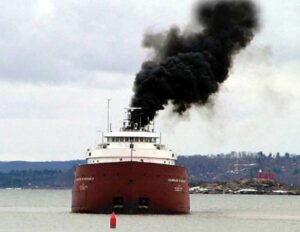The World Shipping Council, the Washington, D.C.-based trade association representing international liner shipping, is sharing for the first time concrete regulatory and economic pathways that it believes the International Maritime Organization must take up in order for the shipping industry to achieve zero carbon emissions.

The WSC has identified six regulatory and economic pathways forward, which WSC says are critical for the nations of the UN International Maritime Organization (IMO) to address for a successful maritime energy transition.
In June, IMO’s Marine Environment Protection Committee will meet for its 78th session (IMO MEPC 78) to consider further development of IMO’s GHG Strategy, which has been scrutinized for not aligning with the goal of the Paris Agreement to limit global warming to well below 2 Celsius compared to pre-industrial levels.
In 2018, the IMO adopted an initial strategy to reduce total GHG emissions from ships by at least 50% by 2050, compared to 2008 levels, but details are still being hammered out and a final strategy is not expected until 2023.
“There will be no single or simple fuel technology solution, no single party that can set the pace, no single regulation that will drive the necessary change,” the WSC said in press release. “The reality will be a complex multi-technology, multi-stakeholder development process that needs to be driven and supported by an array of mutually reinforcing global regulations. Maritime actors, technology providers, fuel innovators, organisations and regulators will need to work together to decarbonise shipping in line with the Paris agreement.”
Read Also: Diana Shipping Inc. Announces Time Charter Contracts for m/v Aliki with Koch and m/v Leonidas P. C. with Cargill
The maritime shipping industry is estimated to account for nearly 3% of the world’s CO2 emissions.
WSC President and CEO, John Butler, says the liner shipping sector understands the “shared responsibility” for the maritime industry to reduce GHG emissions and “we don’t underestimate the challenge,” but he points out that the industry is currently lacking the regulatory framework needed to address key issues.
“We are committed to decarbonising shipping and have multiple ideas and projects in the pipeline. But to be able make these investments, to take the necessary risks, we – and all other maritime actors – need a regulatory framework that addresses the key strategic issues,” says Butler.
“We are now offering our perspective on the critical pathways the IMO should consider as it tackles this global challenge. Action is needed now by the governments of the IMO so as not to stall development but rather to support ambitious innovators and front runners,” he adds.
Kindly like us on Facebook
















Discussion about this post